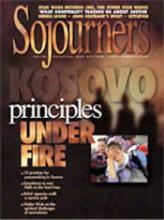War is the great evangelizer. As NATO tosses Tomahawks into Milosevic’s tinderbox, Madeleine Albright says she’ll pray for Serbia. At the same time, in the foxholes of Belgrade basements, cultural atheists are coming to Christ. While Belgrade burns and Pristina becomes a ghost town, prayer seems to be the most powerful weapon in our arsenal. But how do we separate the arrogant petitions of the powerful and the desperate pleas of the weak from that revolutionary act that "moves mountains"?
Authentic prayer brooks no illusions. It is a process of disillusionment. Disillusionment requires education. Education requires context. What is the context for the war in Yugoslavia and what questions must be addressed as we go forward?
FOR MORE THAN 40 years, Tito and his successors squelched religious affiliation or ethnic identity for the sake of a "unified" Communist Republic of Yugoslavia. After Tito’s death in 1980, the country went into sharp economic decline. In 1982, The Wall Street Journal ran a story on the upheaval caused by an International Monetary Fund austerity program in Yugoslavia. The program was causing unrest, especially in a small province called Kosovo.
Lesson one. The end of communism’s enforced monoculture produced a renaissance of ethnic and religious identity and pride in the Balkans. Genuine pluralism cannot be produced by force.
Lesson two. Budgets, international monetary systems, and structural adjustments are moral issues with real and ethical consequences.
Read the Full Article
